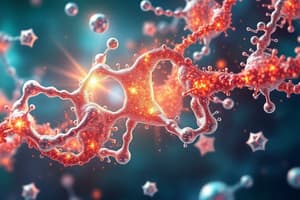Podcast
Questions and Answers
Spontaneous reactions favour the formation of the products under the conditions that the reaction is occurring in - i.e. they naturally want to ______.
Spontaneous reactions favour the formation of the products under the conditions that the reaction is occurring in - i.e. they naturally want to ______.
react
Reactions are favorable when they result in a decrease in ______ and an increase in entropy of the system.
Reactions are favorable when they result in a decrease in ______ and an increase in entropy of the system.
enthalpy
Most, but not all spontaneous reactions are ______.
Most, but not all spontaneous reactions are ______.
exothermic
Spontaneity is not related to the ______ of reaction.
Spontaneity is not related to the ______ of reaction.
For the example of wood burning, some activation energy is required to ______ the flame.
For the example of wood burning, some activation energy is required to ______ the flame.
Study Notes
Spontaneity of Reactions
- Spontaneous reactions favor product formation under specific conditions.
- A reaction's favorability is linked to a decrease in enthalpy and an increase in entropy.
- Most spontaneous reactions are exothermic but not all; spontaneity is independent of the reaction's instantaneous nature.
- Spontaneity does not correlate with the rate of the reaction; activation energy may still be required.
Examples of Spontaneous Reactions
- Baking Soda and Vinegar: Reactants spontaneously form products once mixed.
- Rusting: A slow spontaneous process where iron reacts with oxygen and moisture.
- Wood Burning: Requires initial activation energy (ignition) but continues spontaneously once the reaction begins.
Studying That Suits You
Use AI to generate personalized quizzes and flashcards to suit your learning preferences.
Description
This quiz explores the concept of spontaneity in chemical reactions, focusing on conditions that favor product formation. It covers the relationship between enthalpy, entropy, and the rate of spontaneous reactions, as well as examples such as baking soda and vinegar, rusting, and wood burning.




